Captain Geo: Leon Long’s Five Decades as Teacher, Scientist, and Mentor
November 27, 2012
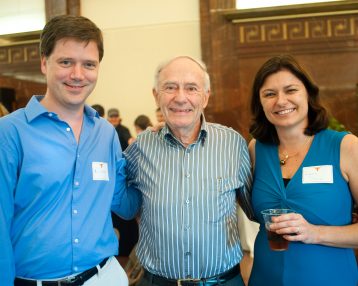
The crowd of about 75 people milled about beneath the giant Texas pterosaur skeleton in the stately polished marble main hall of the Texas Memorial Museum. Display cases filled with gems, fossils and other natural history curiosities lined the walls. In attendance were university professors, staffers, and students, as well as friends and family members.
Having co-taught the large introductory geology course for non-majors (GEO 303) nearly every semester for more than 40 years, Leon Long was accustomed to standing in front of large groups of people, lecturing about geology. Now he sat in front of a large group of people as one after another rose to talk about him. They were there to celebrate his retirement after 50 years in the Department of Geological Sciences.
Many of them spoke of the special connection he forged with students, hundreds of them each semester for more than 40 years.
Dan Barker, emeritus professor in the Jackson School, spent 32 of those years in an office facing Long’s, their doors often open.
“And I always marveled at the time Leon spent talking to students,” said Barker, “until I realized one day, he wasn’t talking to them. He was listening to them.”
Rich Ketcham, an associate professor in the Jackson School who co-taught GEO 303 with Long, and who now is lead instructor of the course, said he learned a valuable lesson from him about how to treat students.
“A huge part of teaching, especially at the introductory level, is meeting the students where they are, actually treating them like individuals, treating them like thinking people,” said Ketcham.
Laurie Duncan, an adjunct assistant professor in the Jackson School who has twice co-taught GEO 303 with Long, and who was a graduate student TA for the course in 1995, noted that each semester dozens of the 400 students in GEO 303 write to Long to ask whether their final course grade can be adjusted for the better.
“And Leon personally writes each of these students a very nice and very heartfelt email that addresses the question, and then goes on to say that this is what happened in this class and this is your life and these two things are not the same,” she said. “It can influence your life, but it’s not everything.”
Birth of a Tradition
It was the early 1960s and Long was a post-doctoral researcher at Oxford University when his Ph.D. advisor from Columbia told him about a job in Texas. Texas seemed like a foreign country. They spoke Texan. But his advisor told him the University of Texas had money. There were snail-mail letters back and forth. Finally, the university offered him a position and he accepted. It was an extraordinary leap of faith on both sides.
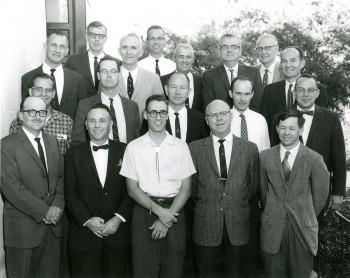
“I didn’t know what the geology program offered here,” says Long. “I didn’t know if they had advanced degrees. I didn’t know anything. I just walked in.”
He had never met the department chair, Stephen Clabaugh. There was no interview. He arrived with little more than the slight British accent he’d picked up as a post doc.
That first semester, Clabaugh asked him to teach an introductory geology course for 220 students. He had no teaching experience, but he said yes.
“There were 200 students sitting there,” he recalls. “And I was so scared. My knees were knocking together. I could hear myself talking, but I was just babbling on and I felt like I wasn’t in control. I was petrified.”
The second time around, he figured out how to organize the material. He found his confidence and started having fun.
Just a few years later, UT revised the science course requirements for all undergraduates. Before then, every student had to take one of two science tracks: either a full year of biology and geology or a full year of chemistry and physics. Now they would be able to choose any combination of science courses “cafeteria style.” The geology faculty decided if they were going to be competitive they had better put together a course that would be broad in scope and of great appeal to general students. And thus GEO 303, the whole of geology boiled down into one semester, was born.
Long and Al Scott, a former professor who retired from the Department of Geological Sciences in 1985, developed and taught the new course. They decided to offer two sections of the course, but rather than each take one section, to co-teach both.
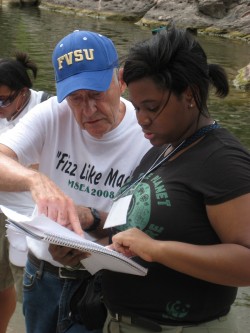
“Al said to me, this course shall be team taught,” said Long. “He was older, much bigger and much more impressive than I was and I said, yes sir! And that’s the way it’s always been and it’s been a wonderful time for me.”
Long reckons he has co-taught the course a staggering 162 times to 31,400 students.
“What stands out the most is his deep passion and almost childhood-like excitement for science and geology,” says Kyle Nelson, an undergraduate student in petroleum engineering who took GEO 303 in 2011. “I would say he is a textbook example for somebody who practices the ages-old adage that in order to be truly happy, one must do what he loves.”
Each semester, when it’s time to talk about the evolution of tetrapods, Long climbs up on a table in front of the class and lies prone like a slithery sea creature.
“My most significant memory of Dr. Long is him laid out face-down on a foldout table, flailing his arms and legs about, imitating what would have been the transportation mode of some ancient creature on its way towards evolving arms and legs,” recalls Nelson.
Calvin Lee (BA ’02), a physician in Massachusetts, says Long inspired him to change his undergraduate major to geology and ultimately choose a career in which he could care for other people. But more than that, he’s grateful to Long for friendship. For years after Lee took GEO 303, Long continued to check in with him, giving him support and encouragement.
“Dr. Long taught me a valuable lesson about relationships—never prioritize any job, goal or task above my relationship with another person,” wrote Lee in a recent letter to Long.
In the early 1970s, McGraw-Hill publishers asked Long to write a general purpose geology textbook. Now in its 15th edition, the book titled simply Geology has been used by thousands of GEO 303 students. Proceeds from the sale of the book go to charity.
In addition to GEO 303, Long spent many years leading two essential field courses in the department: GEO 660—the transformative summer field camp experience for geoscience majors—and GEO 320L—the introduction to field methods for non-majors, many of whom plan to be science teachers. He has also taught graduate courses in isotope geochemistry, his research specialty.
In the late 1980s, some students in a field course got him a white baseball cap with the words “Captain Geo” stitched in orange. He wore it so long that it began falling apart. His daughter eventually had a replacement made for him.
In 1999, Long became the first professor in the Department of Geological Sciences to be inducted into the university’s Academy of Distinguished Teachers. (Since then professors Bill Carlson and Jay Banner have also been inducted.) Among several other awards, in 2001 he received the Chancellor’s Council Outstanding Teaching Award, given to only one recipient each year.
A Geochemist at Heart
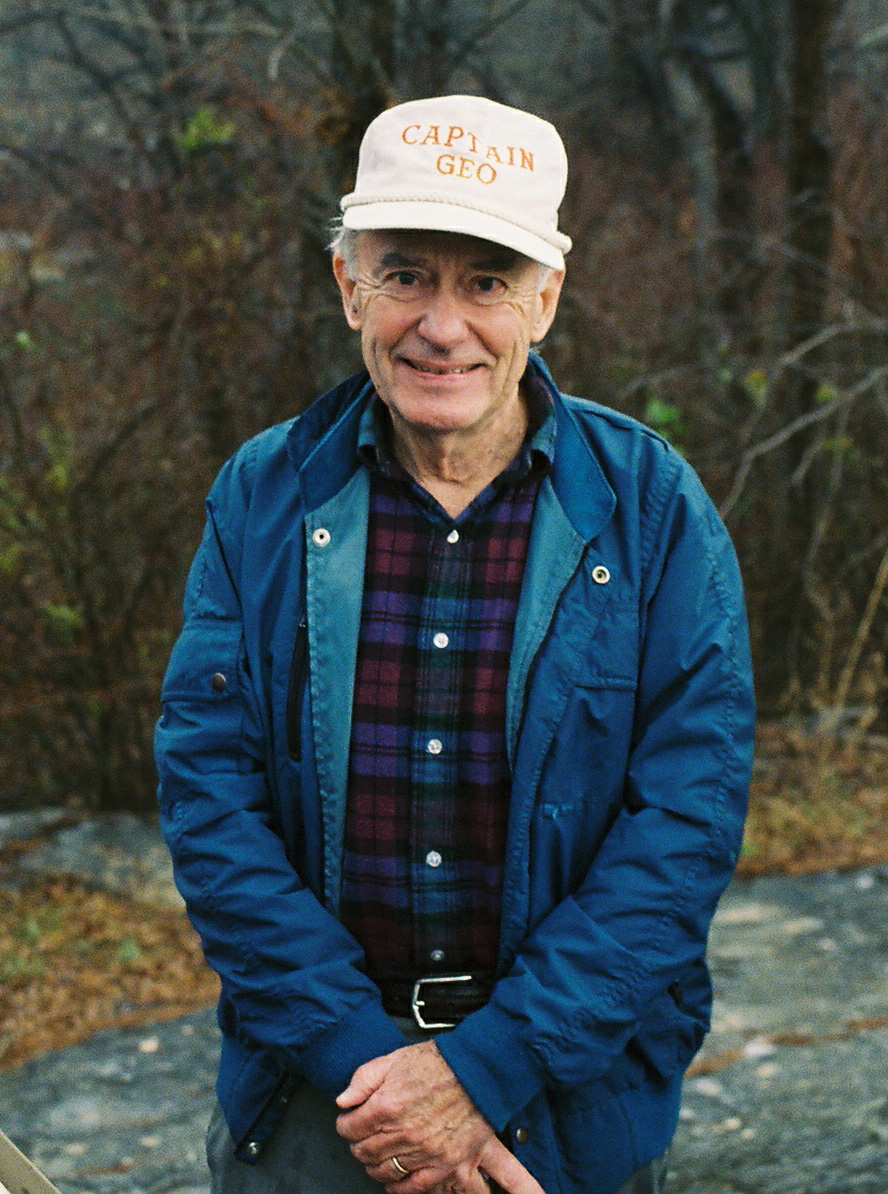
For most people, Leon Long’s name is perhaps synonymous with GEO 303 or teaching in general. But his research has also contributed much to the field of isotope geochemistry. When he arrived at UT, he had a National Science Foundation grant to build the university’s first isotope geochemistry lab. He and an undergraduate student in engineering built a mass spectrometer. Long says this was at a time when he couldn’t buy a system off the shelf that would do the specific kinds of analyses he wanted to do.
He showed for the first time the potential of a geologic dating technique based on the radioactive decay of rubidium into strontium. In his paper, which has been widely cited, Long used rocks in Scotland (analyzed in his Oxford days) as an example of a procedure to unravel a complicated history of development
In the past few years, isotope geochemistry has greatly expanded at the Jackson School. The school has hired several new faculty, including John Lassiter, Jaime Barnes, Dan Breecker, Tim Shanahan and Daniel Stockli, and built major new facilities
If he was a newly minted Ph.D. just starting out today, would Long have chosen isotope geochemistry? Yes, he says. He would have probably just been more productive
“It was heroic in those early days to get even single data points,” he says. “So much work. Now it’s much easier. They’ve got pretty fancy stuff, much of which is automated in its operation. So they can spit out data.
Long is now officially retired, although he does plan to come back to co-teach GEO 303 in spring 2013 with Laurie Duncan. He also plans to focus more on writing up old research, and travel
He hopes to finish a long-simmering research project with a former Ph.D. student from Egypt to reconstruct the history of volcanic rocks along the coast of the Red Sea. In another project, he’s working with a former UTeach master’s student to reconstruct the ancient landscape of the Llano region of Texas that was later covered over by the Cretaceous sea
Long has been to every continent, save one: Antarctica. He plans to rectify that with a trip this December, co-led by Ian Dalziel of the Institute for Geophysics.
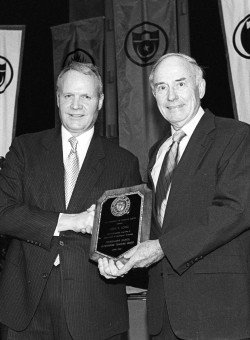
Speaking at Long’s retirement celebration, colleague Mark Cloos recalled how student enrollments plummeted in response to the crash in the oil and gas industry in the 1980s. For several years afterwards, he surveyed students in a senior level geology course about why they became geology majors. He said about a quarter responded that they were inspired by Leon Long.
“He lit their fire and they came even though they knew full opportunities were going to be limited for a good period of time,” said Cloos. “They just thought this was interesting because they had the honor to learn from Captain Geo.”
Sharon Mosher, dean of the Jackson School, remembered meeting Long when she arrived in Austin in the summer of 1978. She had given her final Ph.D. defense the day before and was then whisked away to teach the summer field course with Long. He and his wife took her into their home, helped her find a place to live, and gave her critical advice on how to be a faculty member.
“They got me firmly set on my feet and ready to move forward and I have always, always valued that from him,” said Mosher. “I think it is that ability to nurture young people and understand what they need to know and to succeed that made Leon such an incredible teacher and advisor. He has impacted more faculty and students than anyone else in the Department of Geological Sciences or the Jackson School.”
